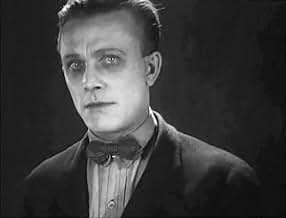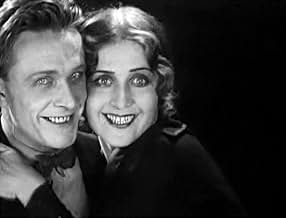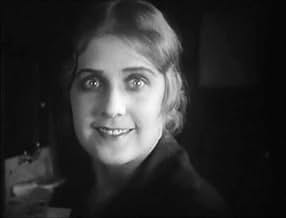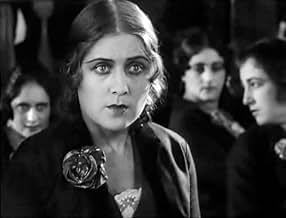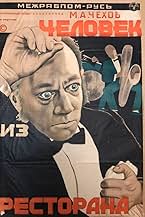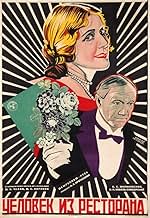Aggiungi una trama nella tua linguaAn elderly man works as a waiter at a luxurious restaurant. He's content and full of hope, and treasures his family more than anything. But it's time of the First World War and news from the... Leggi tuttoAn elderly man works as a waiter at a luxurious restaurant. He's content and full of hope, and treasures his family more than anything. But it's time of the First World War and news from the front change his life.An elderly man works as a waiter at a luxurious restaurant. He's content and full of hope, and treasures his family more than anything. But it's time of the First World War and news from the front change his life.
Vera Malinovskaya
- Natasha
- (as V. Malinovskaya)
Andrey Petrovsky
- The General
- (as A. Petrovsky)
Mark Prudkin
- Officer
- (non citato nei titoli originali)
Sergei Tsenin
- Officer
- (non citato nei titoli originali)
Trama
Lo sapevi?
- ConnessioniFeatured in Legendy mirovogo kino: Mikhail Zharov
Recensione in evidenza
Ivan Sergeevich Shmelev (1873-1950) was a beloved author of many books about pre-Revolutionary Russia and its Orthodox Christian way of life, fanatically attacked by the demonic forces of Communism. His original story "The Man from The Restaurant" was a sympathetic look at regular people of that earlier time, written in 1910, YEARS BEFORE the Anti-Russian Revolution of 1917. He had absolutely nothing in it of the propaganda that the agents of Bolshevik terror twisted it into in 1927.
..... Shmelev's son was executed by the Communists in 1920 in Crimea, and the author hated Communism. There is no way he would have ever written the travesty of this movie plot, which gives a Communist propaganda view.
...... Here is a complaint published in a newspaper, written by the author himself in the early 1930s, against the perversion of this film: (translated by me):
PROTEST OF IVAN SHMELEV
We received a request to print the following letter from Ivan. S. Shmelev: "I have learned from newspapers that, following after the cinemas of Germany and Latvia, there will soon be shown on the French screen a film, reworked from my novel "The Man from the Restaurant". Therefore I consider necessary once again to address the public with the following statement: I. I did not give to anyone in the USSR the right to recast my novel for a movie. The right of worldwide screen production of "The Man" was acquired from me in the autumn of last year by the Berlin impresario Borkon on condition that a foreign cinematographic company will produce the film, and the scenario will be presented to me for viewing, wherein Borkon was obligated not to transfer the rights acquired by him for "The Man" to Soviet business operators. II. What the Soviet Mezhrabpom Rus (["Workers' International Aid, Russia") did with my "The Man", with the participation of several actors of the Soviet Art Theater in Moscow, "has no name", as the well-known writer Peter Pil'sky (newspaper Tonight, dated January 18 writes in the article "Literary films in Riga": "for even the most shameful and stigmatizing words are powerless to communicate this violence against the entire scope, idea, plot, and even common sense. Sovkino (Soviet Film organization) most controversially, turned Shmelev's story, and made of it an openly brazen propaganda forgery". To represent the "foulness of the bourgeois system", the Bolsheviks used the popularity of the novel that had been translated, by the way, also into French, and transferred the action to 1916-17. In the meantime, since the novel had been written in 1910, they perverted the idea of the novel, and in the interests of propaganda thought up their own contents, changed the destinies and characters of the dramatis personae, and filled everything with lies, filth, and platitudes in glory of Leninism and in mockery of the "dissolute bourgeoisie and Tsarist military officers", and in glorification of the "perishing proletariat of wounded poor people", and so forth. "By calculation of the director," affirms P.M. Pilsky in the article, "the heart of the viewer must tighten and be filled with great indignation against the 'mean-spirited' system... For the sake of this, Shmelev was a sacrificial victim. Even from responses of the Soviet reviewers who have appeared for this time as more discerning in literary relations than certain actors of the wonderful theater led by the Leonidovs, who assisted this way in perverting the novel well-known to them, by a Russian writer well-known to them - even, I repeat, from responses of the Soviet reviewers of "Moek. Izvestiia" of August 21, and "Krasn. Niva" -- "Shmelev's story was subjected to 'radical recasting'". "In the subject, i.e., in that main thing for the sake of which the story is written, there is no contact between the cinema and Shmelev's story, and the very plot of the picture, having almost nothing coinciding with the plot of the story, turned out to be a typical melodrama..." III. Thus, this "recasting" and showing it all over the world is a violation against a Russian writer and against the spirit of his work, and is an impudent deception in order to incite class hatred in Europe and all over the world and a malicious attempt to bring to life even more lies and evil. And the deceivers are trying to reinforce this worst deception by the authority of the work, which has absolutely nothing in common either with evil or with the lie. The brazenness of the Soviet business operators has even reached such as level that in their clamorous advertising, near my name and the name of my work they print also my distorted portrait, reworked by some unknown means. I will fight, as far as it is in my strength, with all lawful means against similar deception and violation. I request that the Russian foreign publications provide space for my announcement.
We received a request to print the following letter from Ivan. S. Shmelev: "I have learned from newspapers that, following after the cinemas of Germany and Latvia, there will soon be shown on the French screen a film, reworked from my novel "The Man from the Restaurant". Therefore I consider necessary once again to address the public with the following statement: I. I did not give to anyone in the USSR the right to recast my novel for a movie. The right of worldwide screen production of "The Man" was acquired from me in the autumn of last year by the Berlin impresario Borkon on condition that a foreign cinematographic company will produce the film, and the scenario will be presented to me for viewing, wherein Borkon was obligated not to transfer the rights acquired by him for "The Man" to Soviet business operators. II. What the Soviet Mezhrabpom Rus (["Workers' International Aid, Russia") did with my "The Man", with the participation of several actors of the Soviet Art Theater in Moscow, "has no name", as the well-known writer Peter Pil'sky (newspaper Tonight, dated January 18 writes in the article "Literary films in Riga": "for even the most shameful and stigmatizing words are powerless to communicate this violence against the entire scope, idea, plot, and even common sense. Sovkino (Soviet Film organization) most controversially, turned Shmelev's story, and made of it an openly brazen propaganda forgery". To represent the "foulness of the bourgeois system", the Bolsheviks used the popularity of the novel that had been translated, by the way, also into French, and transferred the action to 1916-17. In the meantime, since the novel had been written in 1910, they perverted the idea of the novel, and in the interests of propaganda thought up their own contents, changed the destinies and characters of the dramatis personae, and filled everything with lies, filth, and platitudes in glory of Leninism and in mockery of the "dissolute bourgeoisie and Tsarist military officers", and in glorification of the "perishing proletariat of wounded poor people", and so forth. "By calculation of the director," affirms P.M. Pilsky in the article, "the heart of the viewer must tighten and be filled with great indignation against the 'mean-spirited' system... For the sake of this, Shmelev was a sacrificial victim. Even from responses of the Soviet reviewers who have appeared for this time as more discerning in literary relations than certain actors of the wonderful theater led by the Leonidovs, who assisted this way in perverting the novel well-known to them, by a Russian writer well-known to them - even, I repeat, from responses of the Soviet reviewers of "Moek. Izvestiia" of August 21, and "Krasn. Niva" -- "Shmelev's story was subjected to 'radical recasting'". "In the subject, i.e., in that main thing for the sake of which the story is written, there is no contact between the cinema and Shmelev's story, and the very plot of the picture, having almost nothing coinciding with the plot of the story, turned out to be a typical melodrama..." III. Thus, this "recasting" and showing it all over the world is a violation against a Russian writer and against the spirit of his work, and is an impudent deception in order to incite class hatred in Europe and all over the world and a malicious attempt to bring to life even more lies and evil. And the deceivers are trying to reinforce this worst deception by the authority of the work, which has absolutely nothing in common either with evil or with the lie. The brazenness of the Soviet business operators has even reached such as level that in their clamorous advertising, near my name and the name of my work they print also my distorted portrait, reworked by some unknown means. I will fight, as far as it is in my strength, with all lawful means against similar deception and violation. I request that the Russian foreign publications provide space for my announcement.
I più visti
Accedi per valutare e creare un elenco di titoli salvati per ottenere consigli personalizzati
Dettagli
- Data di uscita
- Paese di origine
- Lingue
- Celebre anche come
- Man from the Restaurant
- Azienda produttrice
- Vedi altri crediti dell’azienda su IMDbPro
- Tempo di esecuzione1 ora 2 minuti
- Colore
- Mix di suoni
- Proporzioni
- 1.33 : 1
Contribuisci a questa pagina
Suggerisci una modifica o aggiungi i contenuti mancanti

Divario superiore
By what name was Chelovek iz restorana (1927) officially released in Canada in English?
Rispondi
